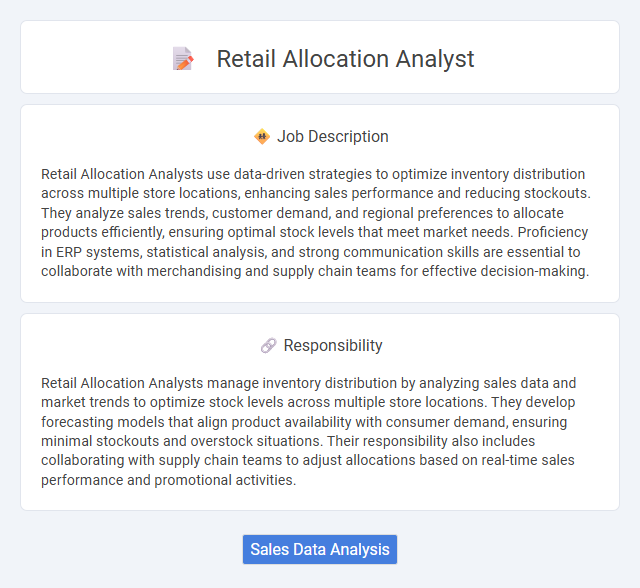
Retail Allocation Analysts use data-driven strategies to optimize inventory distribution across multiple store locations, enhancing sales performance and reducing stockouts. They analyze sales trends, customer demand, and regional preferences to allocate products efficiently, ensuring optimal stock levels that meet market needs. Proficiency in ERP systems, statistical analysis, and strong communication skills are essential to collaborate with merchandising and supply chain teams for effective decision-making.
Individuals with strong analytical skills, attention to detail, and a passion for data-driven decision-making are likely suitable for a Retail Allocation Analyst role. Those who thrive in fast-paced environments and possess effective communication skills may better handle collaboration with cross-functional teams. People lacking patience for repetitive tasks or discomfort with interpreting complex data might find this position challenging.
Qualification
Retail Allocation Analysts require strong analytical skills and expertise in inventory management systems to optimize product distribution across stores. Proficiency in data analysis tools such as Excel, SQL, and forecasting software enables accurate demand planning and sales trend evaluation. A background in business, supply chain management, or a related field, combined with attention to detail and problem-solving abilities, is essential for success in this role.
Responsibility
Retail Allocation Analysts manage inventory distribution by analyzing sales data and market trends to optimize stock levels across multiple store locations. They develop forecasting models that align product availability with consumer demand, ensuring minimal stockouts and overstock situations. Their responsibility also includes collaborating with supply chain teams to adjust allocations based on real-time sales performance and promotional activities.
Benefit
Retail Allocation Analysts likely enhance inventory distribution efficiency, improving product availability and reducing stockouts. Their role probably contributes to increased sales and optimized supply chain costs by aligning stock levels with consumer demand. Effective allocation decisions may also support better customer satisfaction and profitability for retail businesses.
Challenge
Retail Allocation Analysts likely face the challenge of accurately forecasting demand across multiple store locations, requiring precise data analysis and interpretation. Balancing inventory levels to optimize sales while minimizing excess stock probably demands strong problem-solving skills and attention to market trends. Handling fluctuating consumer behavior and supply chain disruptions may further complicate effective allocation decisions.
Career Advancement
Retail Allocation Analysts play a crucial role in optimizing inventory distribution across multiple store locations to maximize sales and reduce stockouts. Mastery in data analysis, demand forecasting, and inventory management software significantly enhances career advancement opportunities within retail operations or supply chain management. Progression often leads to senior analyst roles, supply chain management positions, or strategic planning roles, driven by proven expertise in driving sales performance through effective allocation strategies.
Key Terms
Sales Data Analysis
Retail Allocation Analysts specialize in interpreting sales data to optimize product distribution and inventory management across multiple store locations. They utilize advanced data analytics tools and retail performance metrics to forecast demand, adjust stock levels, and maximize sales potential. Proficiency in sales data analysis, demand planning, and inventory allocation software is essential for driving efficient retail operations and increasing profitability.
 kuljobs.com
kuljobs.com